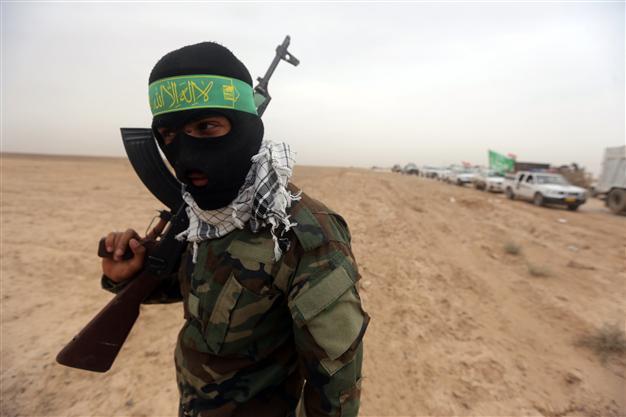European police team to take on ISIL social media propaganda
LONDON - Reuters

An Iraqi Shiite fighter from the Popular Mobilization units holds a position on the Tharthar frontline on the edge of Anbar province, 120 kms northwest of Baghdad, on June 1, 2015. AFP Photo
A Europe-wide police unit is to be set up next month with the aim of shutting down social media accounts used by key Islamic State of Iraq and the Levant (ISIL) militants to spread propaganda and recruit foreigners to their cause, Europol said on June 22.The small police team will scour the internet and try to take down accounts of ISIL ringleaders within hours of being detected, in a bid to dent a propaganda machine which is reckoned to send out about 100,000 tweets a day.
"It's a reasonable estimate and it indicates the scale of the problem that we are up against," Rob Wainwright, Director of Europol, the Hague-based police agency which will coordinate the unit, told BBC radio.
Up to 5,000 people from Western Europe are thought to have travelled to Syria and Iraq, many to join ISIL, causing widespread concern among European states that their citizens could return radicalised and ready to carry out attacks at home.
Two British cases have highlighted its allure in the last week: a 17-year-old from northern England became Britain's youngest suicide bomber in an ISIL attack in Iraq, while three sisters abandoned their husbands and are believed to have taken their nine children to join the militants in Syria.
Wainwright said ISIL was technologically advanced and had moved into social media in a way no militant group had done before.
The new police unit, initially made up of about 10-20 officers from across Europe, will work with unnamed social media companies to target the accounts used by prominent ISIL figures in multiple languages.
A report by US think-tank the Brookings Institution in March estimated there were at least 46,000 Twitter accounts supporting ISIL and possibly as many as 90,000, and Wainwright accepted it would be impossible to get rid of all internet profiles.
"In the end, what we are hoping to have is a strategic impact against the problem as a whole rather than just playing a simple numbers game," he said.
Peter Neumann, director of the London-based International Centre for the Study of Radicalisation and Political Violence, which has closely studied the internet use of European fighters in the region, said the unit should have some impact, but would be reliant on social media firms' cooperation.
"It's not only about reducing the supply of extremist material on the internet, it's also about increasing the amount of counter-extremist messages that directly challenge the extremist narrative," he told Reuters.
"You have to accept that you will never be able to take everything down."
















